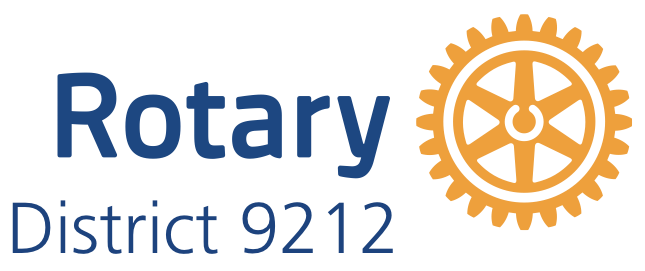From Club President to District Governor and Back to Club President: Meet Hamid Aboo
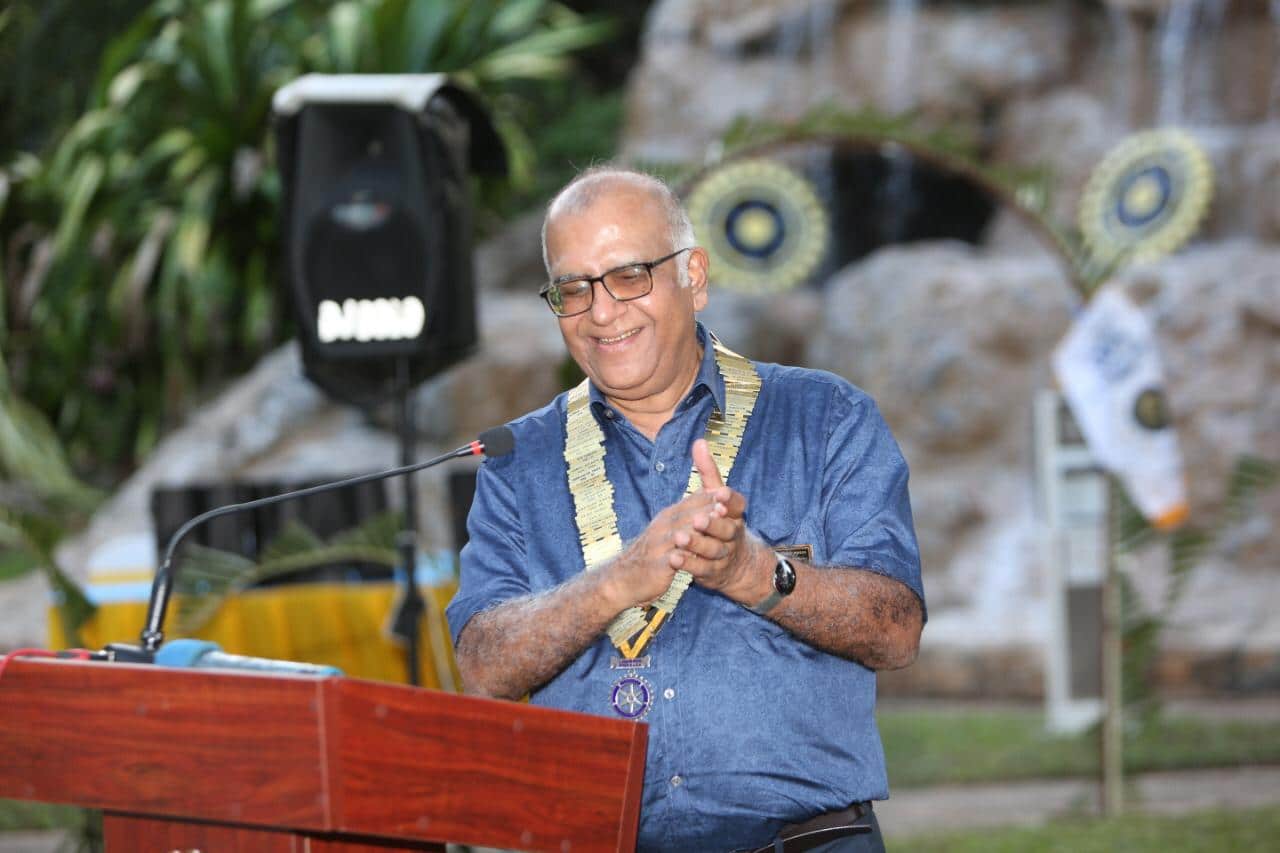
Abdulhamid Aboo popularly referred to as Hamid Aboo is President of the Rotary Club of Mombasa in 2020-21. He is a lawyer by vocation, having practiced for over 40 years and counting. President Aboo is married and has four children; three daughters, all of whom are married, one son, engaged, and amongst the latest member of his club, part of the stock of 25 inductees just recently inducted! He is also a proud grandfather of four.
“I am very open-minded, easy-going and a stickler for organization and careful and articulate planning. I love to socialize, my best life-long friends are amongst fellow Rotarians and I love to travel and experience new places and cultures,’’ he says.
As a previous serving President then District Governor, Why DG to President?
I was inducted as a Rotarian in 1981 aged 26, only 2 months after my wedding. Memuna and I have grown into Rotary. I was chairman in 1989/90. The Rotary theme of the year was “Enjoy Rotary”. NEVER BEEN BETTER!
I was selected as District Governor at the 2003 Conference at Whitesands in Mombasa. I had not been nominated by the club nor was I among those being vetted for the position/presented to the District Governor Nominating Committee for consideration for DG 2005/6.
On the conference floor, as it were, Past District Governor Amu Shah asked me if I would accept the position, should I be appointed. I informed him that politics played a big part in the District at the top level and at the time there was a senior worthy Rotarian in Uganda who had been a victim of power plays and had therefore been sidelined and hijacked. I thought that he should be asked first and only after if the position had not been filled, would I take it up. It was thereafter that I was appointed District Governor.
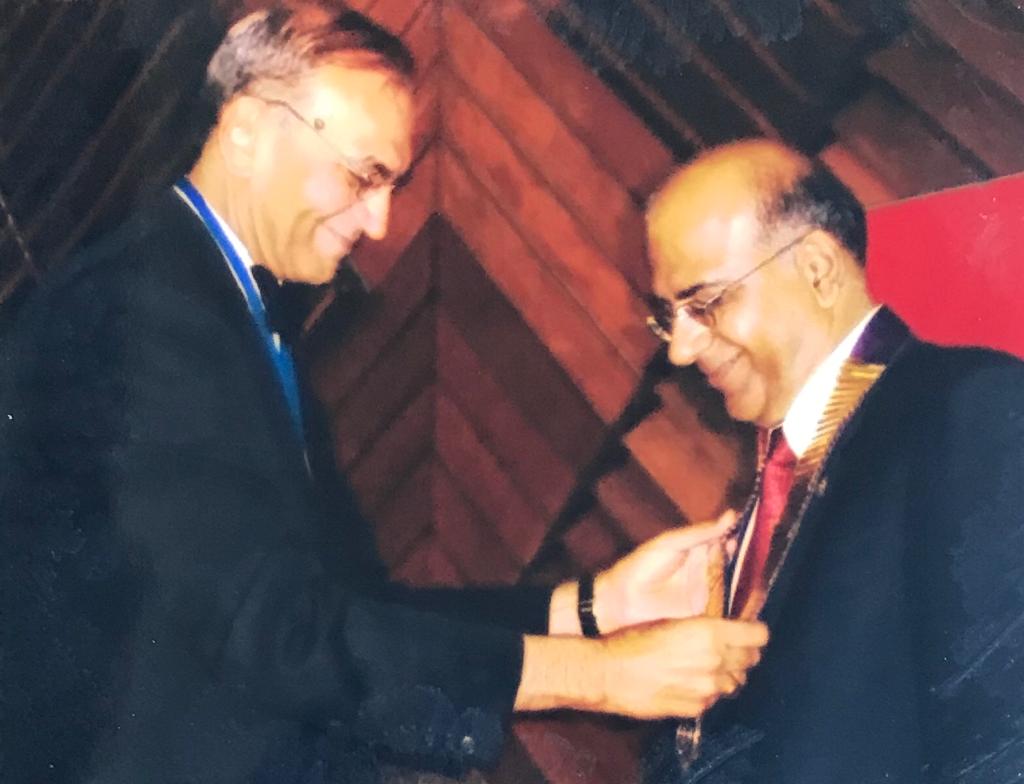
Hamid Aboo’s installation as DG in 2005
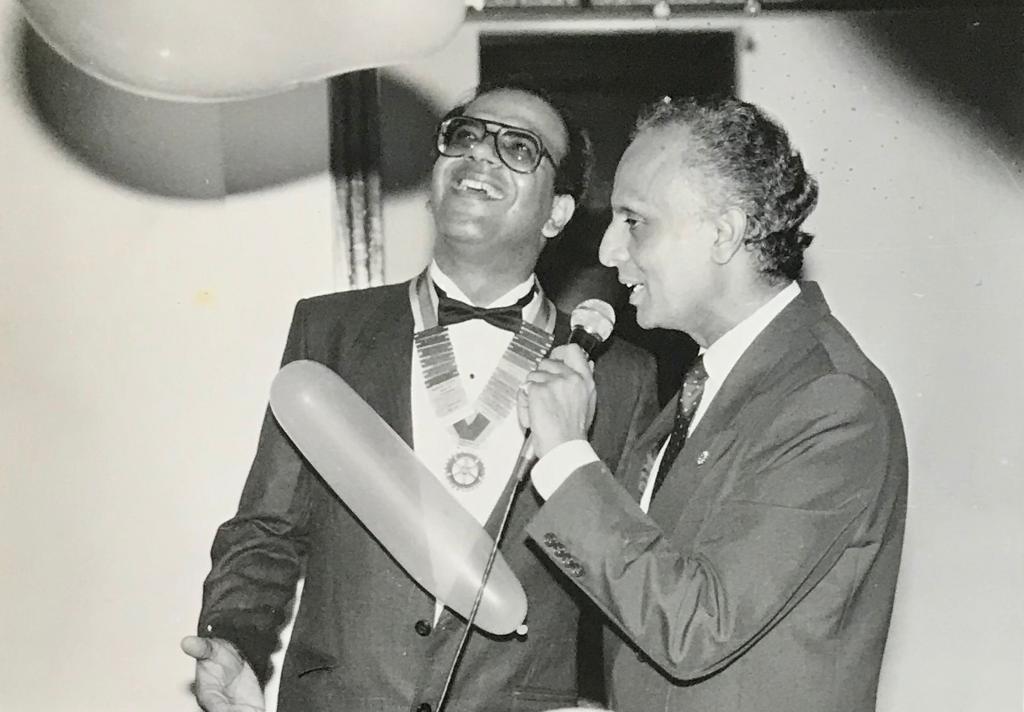
Hamid Aboo shares a hearty moment with PDG Amin Merali
The reason I became president again was that the club was in ICU, a club which was once auto-run based on its very strong structure. The club once upon a time was able to weather weak leadership due to the strong structures in place. Everything had crumbled.
There was no one to take up the leadership position and in the month of February 2020, the District Governor wanted to know who would become the Club President waiting for the white smoke. The Club Chairman invited a few seniors for an instant solution. But old baggage had to be sorted out first.
The Club had accumulated liabilities due to personalized issues, sour relationships and the clashing of super egos. There was a need to sort out relationships first and foremost for a lasting solution and therefore a social meeting was held at my house over dinner, very well attended, where all were able to vent out their frustrations and bury the hatchet in order to move forward.
I was asked to be Club President and I agreed to the same with the following conditions- that there were going to be regular meetings where “Rotary goes to lunch” which venues would be interchangeable. There would also be socials with spouses on every fourth meeting. That the regular meetings be reduced from every week to alternate week. I was also going to make appointments of members to designated committees and the same were to be accepted by all without exception. The attendance exemptions were put aside on the side burner. Every member was required to attend committee meetings without fail, because Rotary work happens at committee level more effectively. Success of a club is measured against success in the workability of committees.
It was also my goal to double the size of the club and every member was to recommend a new member. A club of 60 years average age, 70% past presidents and five octogenerians is a sick club. The board was broadened and older members were made as directors and the newer members as assistant directors to allow for the easy access of information and smooth succession, besides doubling the leadership pool. There had to be an instant growth for survival. Either now or never. The average member age has already dropped to 50 years, still going down.
What was your preferred role between the two and where do you think you have contributed the most impact?
It is my opinion that both roles are and have been important. As DG my goal was to demystify the position of the DG. Remove the small “g” from “governor”.
I was able to create a strong leadership pool at the District level and as Club President, I have been able to grow the club, strengthen the club committees and revamp the image of the organization as a whole, re-instilling pride of being a Rotarian in the members themselves and the image and prestige of club in the public domain. I see the Rotary brand as more important than a specific club, literally dressed up Rotarians in Rotary merchandise. The Rotary Wheel is pure magic. Sell it!!!
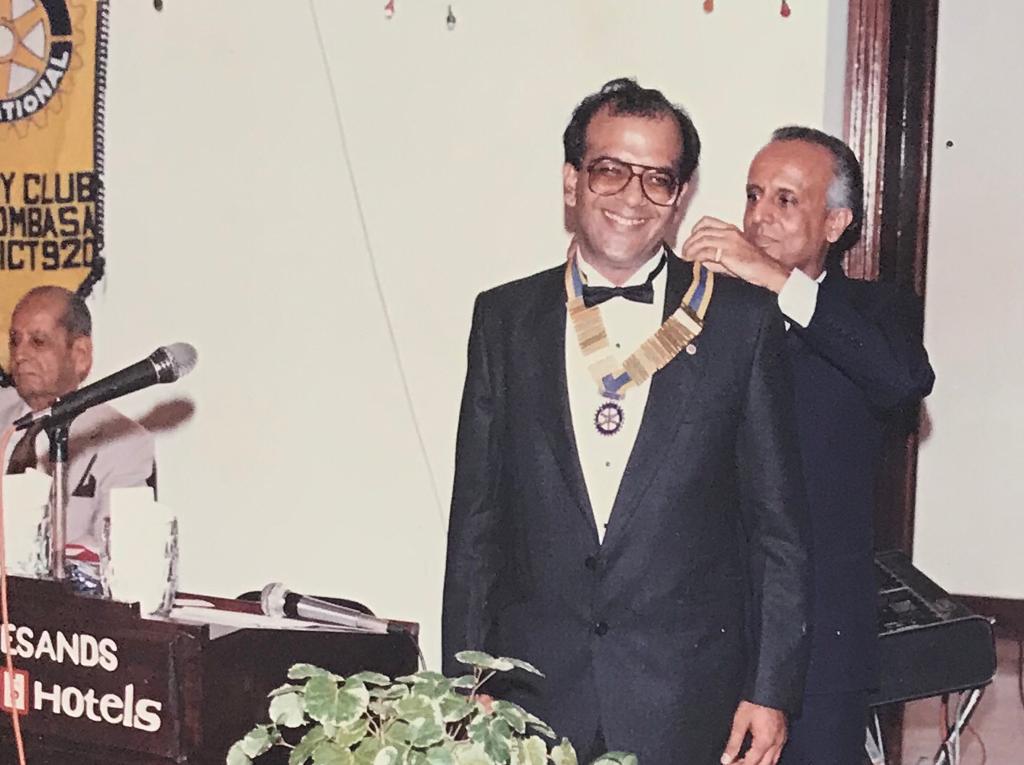
What is the one project that you conducted that has stood out for you as a Rotarian and influenced your service to others throughout the years?
As a District Governor, I developed the website which had been launched by my predecessor Mohamed Abdulla. I was able to enhance the reach of the website, significantly increasing the number of hits. This was at a time when emails were beginning to circulate and I was, therefore, able to use the same to enhance communication with fellow Rotarians and the District Leadership team. Social Media was a far cry. The training programs and personal recognitions rolled out under me as DG, as well as the Rotary Foundation Grants Multiplication. The precondition to be on my cabinet was to be computer literate.
I nurtured a very strong leadership pool, amongst whom many have since been appointed as DG including appointments at Rotary International level; Geeta Manek has gone on to become a Rotary Foundation Trustee. I also canvassed for appointment for my past leaders at Rotary International stage. There was neglect and silence for too long. On reflection, I feel good. That personal self-satisfaction means more to me than accolades, or sing songs.
What do you consider as your greatest achievements and successes?
There are several such as the one stated above. I was also part of the fundraiser that brought two S class Mercedes with a duty waiver which were sold and became the core capital of the Medical Trust Fund. I have been able to double the club size by bringing in new members as Club President. The various committees established under my leadership are fully operational and meeting each month as required, which meetings have proven to be effective and fruitful in attaining the goals of the respective committees. I have given life and purpose to the availability of “Honorary Memberships”, being an avenue of mutual benefit. Least I forget, after being DG I represented the district at the 2010 Council of Legislation, hobnobbing with an array of Rotary International Presidents.
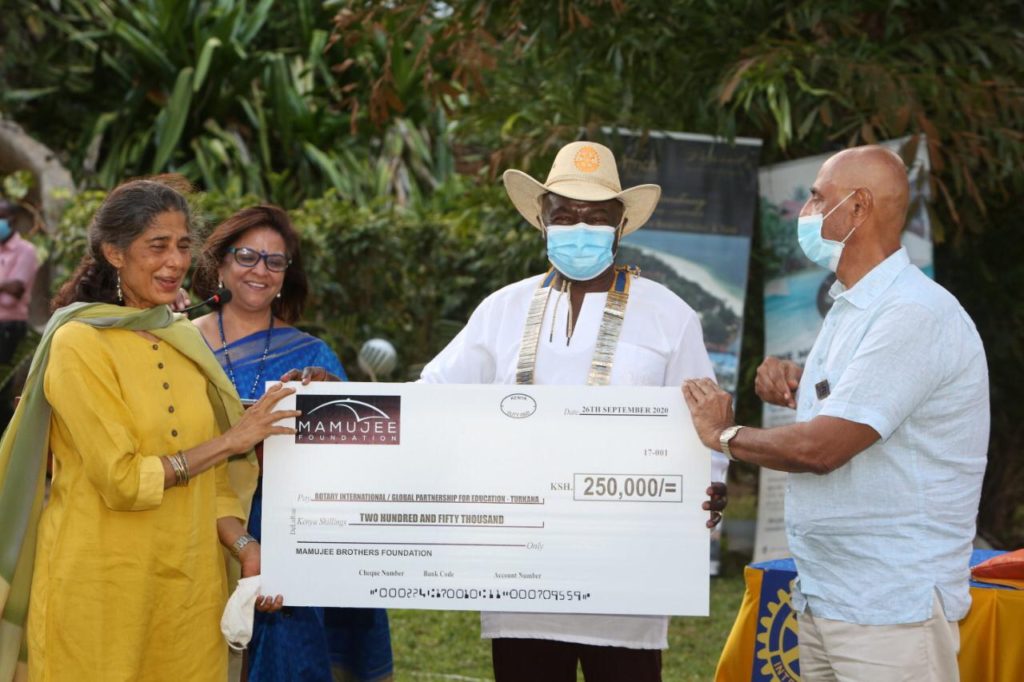
A recent donation by Musti and Shakila Mamujee to Rotary International through the District Governor ,Patrick Obath towards Global Partnership for Education in Turkana.
What do you think are the key things your club still has to work on to ensure sustainable long-term growth?
The club needs to work on Rotary Foundation projects and opportunities. The club is weak in all aspects of the Rotary Foundation – both in giving and receiving. It has unfortunately neglected the Grants avenue. There is also a need for transition in leadership to new Rotarians as early as possible. The club needs to fast track and be treated as a newly chartered club where all the Rotarians are considered as equal. The barriers must be broken and broken fast.
With the success of the much applauded and historic ‘Super Duper Induction’, what next?
Assimilation and retention to ensure that new Rotarians become “Real Rotarians” who have a sense of ownership and belonging to the club so as to remain Rotarians well into their golden years. Therefore, the Super-Duper Induction was just the beginning. The purpose of the event was to infuse pride and importance within existing members and to welcome the new members with a BANG! It was a declaration to the Mombasa Community and the District at large that The Rotary Club of Mombasa has been re-ignited, resurrected, and is back into business. The Big Brother is around once again. More seriously, I would like my Club to be a peer, a club to emulate and be an example of how to do it right.
What goes into restoring a club’s glory and legacy such as yours?
First, building a corporate structure. Rotary works at committee levels. ‘Rotary Goes For Lunch’ at regular meetings, save for specific close door Club Assemblies, to save public squabbles turning the club meetings into talk shop and cliques. Avoid negativity at all costs. Ignore the naysayers. Concentrate on positive energy. KILA KITU INAWEZEKANA (Everything is possible. Period!)
Create an environment of Friends Fun Fellowship Networking and Service. In that order. Ask the question, Why should anyone join your club? What do you have to offer? Successful business and professional people have many options besides their vocations. Why choose your club? Don’t shy away from being labeled as ‘elitist’. Members must be cherry-picked meeting the criteria of being a Rotarian. Persons successful in their chosen vocations. Rotary is not a scouting movement or the Salvation Army. Have a large club with a large variety in membership in terms of Gender, Faith, Race, and vocations purposely attracting the bees to the pollen. These basics are not nuclear science. Remember, you need givers, not takers!
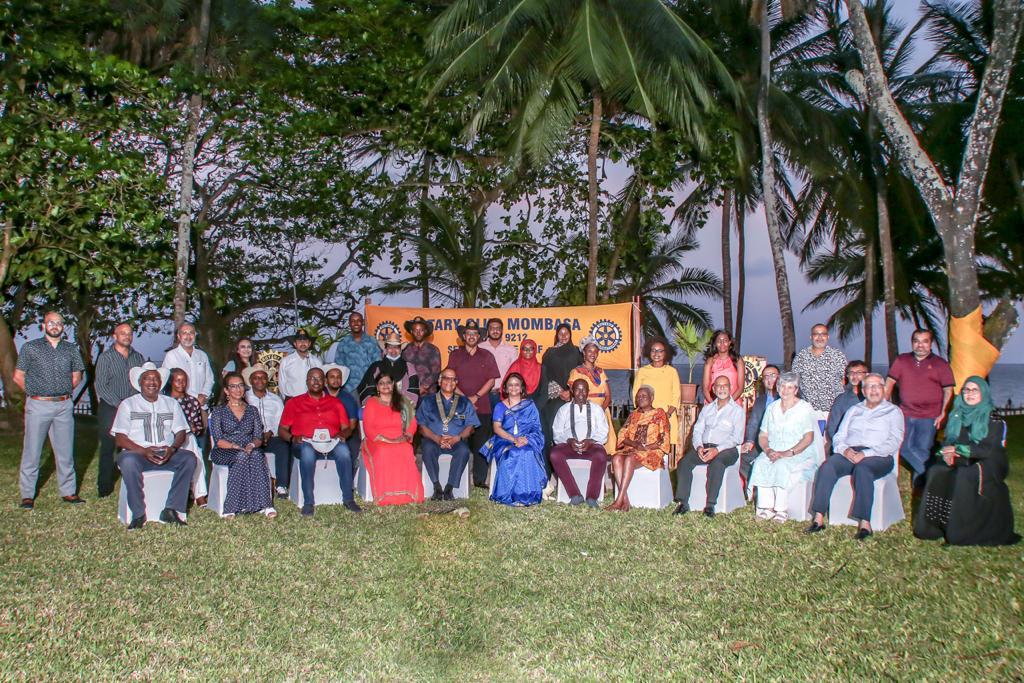
With the MOU signed with the County Government of Mombasa and the various projects already embarked on, what else should we be expecting?
We intend to partner with local organizations, other international rotary clubs, individuals, and charities to facilitate further community and service projects.
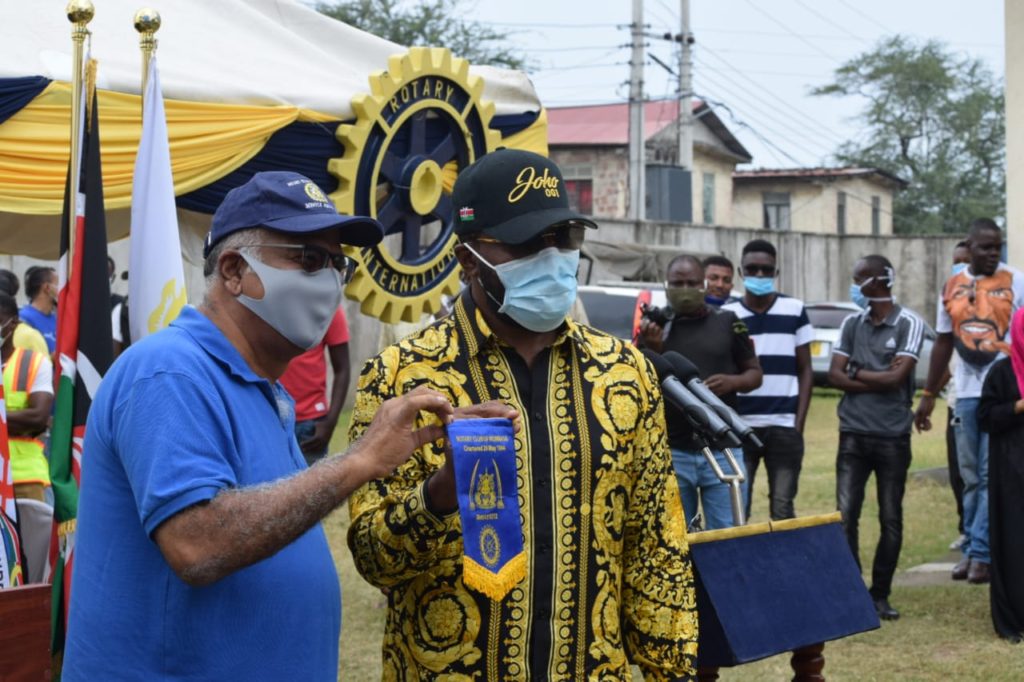
Work on Global and District Grants is now a priority and learning the ropes of TRF.
Rotary is Family. Create an environment of enjoying Rotary as a family. Outings, socials, birthday recognitions by sending surprise gifts to Rotarians and their spouses. Make Rotary Children part and parcel of the club. Keep your members therefore engaged at the ‘ONE STOP SHOP’. Take Rotary into the homes of Rotarians- Consider home hospitality for committee meetings post-COVID. By diversity Rotary gives you an opportunity to be thinking outside the box. No point conducting meetings in a vernacular language.
We intend to also set up a crowdfunding system for various projects whereby people the world over will be able to go on the website and donate directly to the Rotary Club of Mombasa via PayPal, M-Pesa, credit cards, etc. These funds shall then be utilized for service and community projects.
We have to have ongoing projects in order to retain members and such projects need money. Crowdfunding has the potential. Availability of funds instills the desire within volunteers to spend their time, skill, and resources on Rotary projects. Being a Rotarian, one must have a purpose beyond networking at some point in time. Service is born out of friends, fellowship and networking.
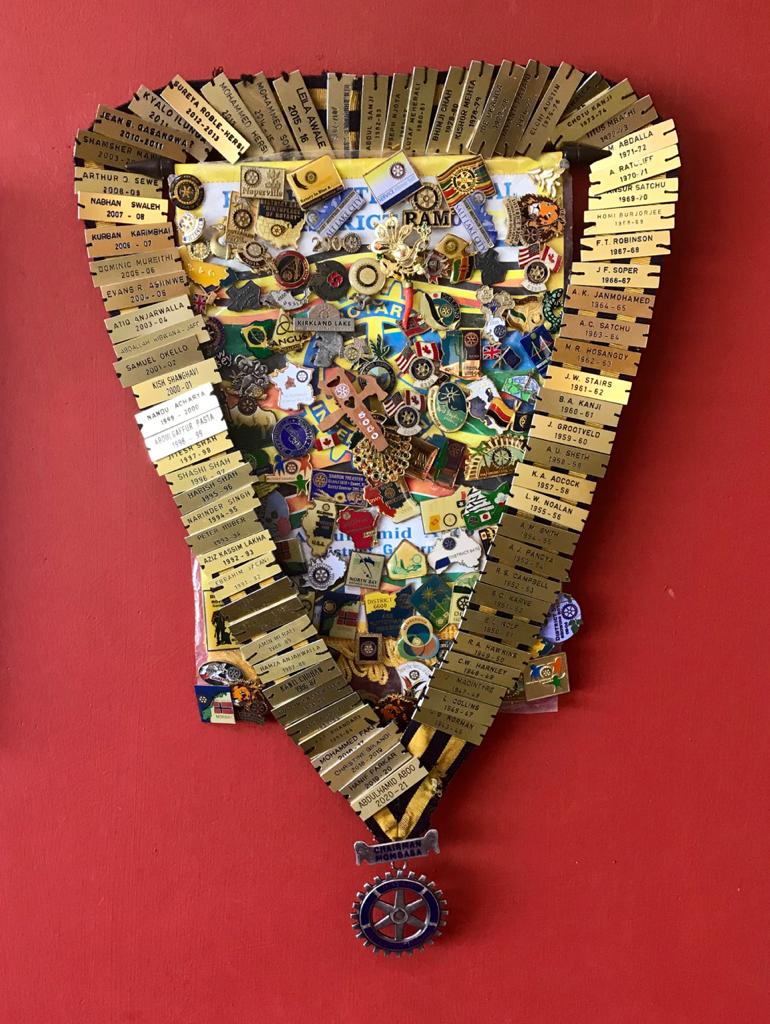
The Rotary Club of Mombasa Presidential Chain that represents the Club’s rich history
Who do you credit your successes as a leader?
The greatest contributor to my success as a leader is my late father. He was a member of the Lions Club of Mombasa. In 1969, he asked me if I was willing to become a member of the Leo Club, which was a school-based club to be chartered by the Lions Club. I became President of the Leo Club at the age of 14 years, which I believe that was my introduction into the world of service and leadership. I was a Form 2 student. Thereafter, it was my participation in debating clubs at school and later university and lastly my professional exposure has influenced my success as a leader.
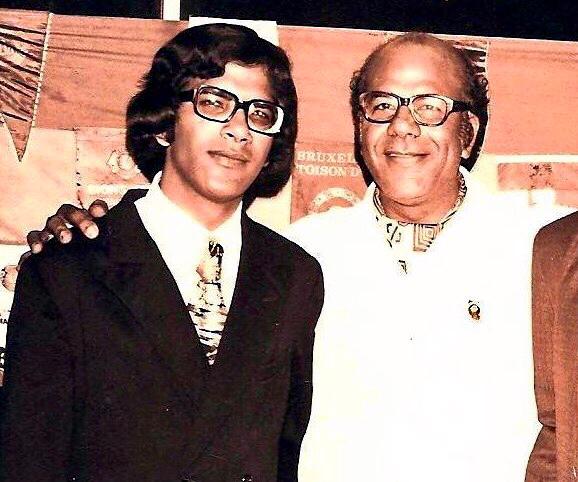
In the Rotary world, I credit Past District Governor Yusuf Kodwavwala, an icon and a living legend, a true gentleman.
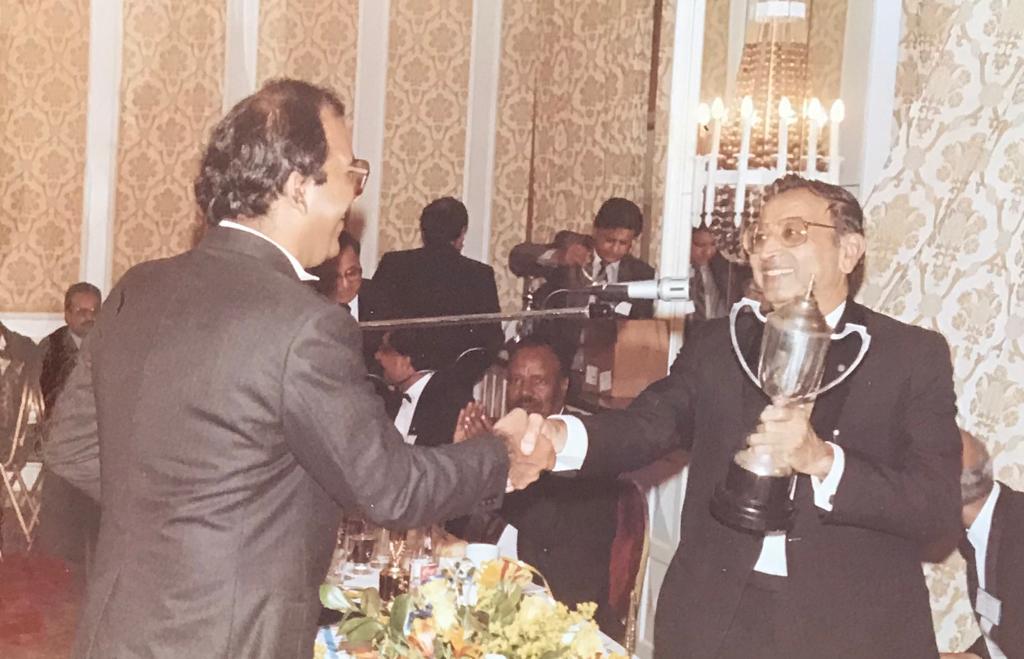
PDG Yusuf Kodwavwala presenting Aboo an award for best Club President and best Club in the District.
What do you see as the future of Rotary within District 9212?
Rotary in its desire to grow numbers must not dilute it into a non-entity. That would be a disservice to the marketability of the brand. Rotary must remain special in whichever environment it operates and exists in. Expect variations between rural/urban. Far too many clubs, too quickly result consequently into neglect, from both within and without. These numbers translate into success and alarm simultaneously. The District Leadership must bite the bullet. Legacy is not about numbers alone, but about the strength in numbers.
We are getting too bureaucratic. Taking leadership roles seems to be a full-time job. Rotarians are working people who volunteer to become Rotarians. Rotary clubs don’t pay salaries. Loosen the shackles, for God’s sake!
What are the fundamental lessons you have learned over the four decades you served in Rotary?
Humility – I believe that is the most fundamental lesson I have learned. I have seen humbleness from the most successful, wealthy, most educated, and smartest people I have ever known.
The Importance of friendship. My best friends are Rotarians. My social life and that of my wife and family are greatly influenced by Rotary. My children’s fondest memories are those of activities, parties, friends met and made at Rotary events. These relationships and friendships have now spanned over generations.
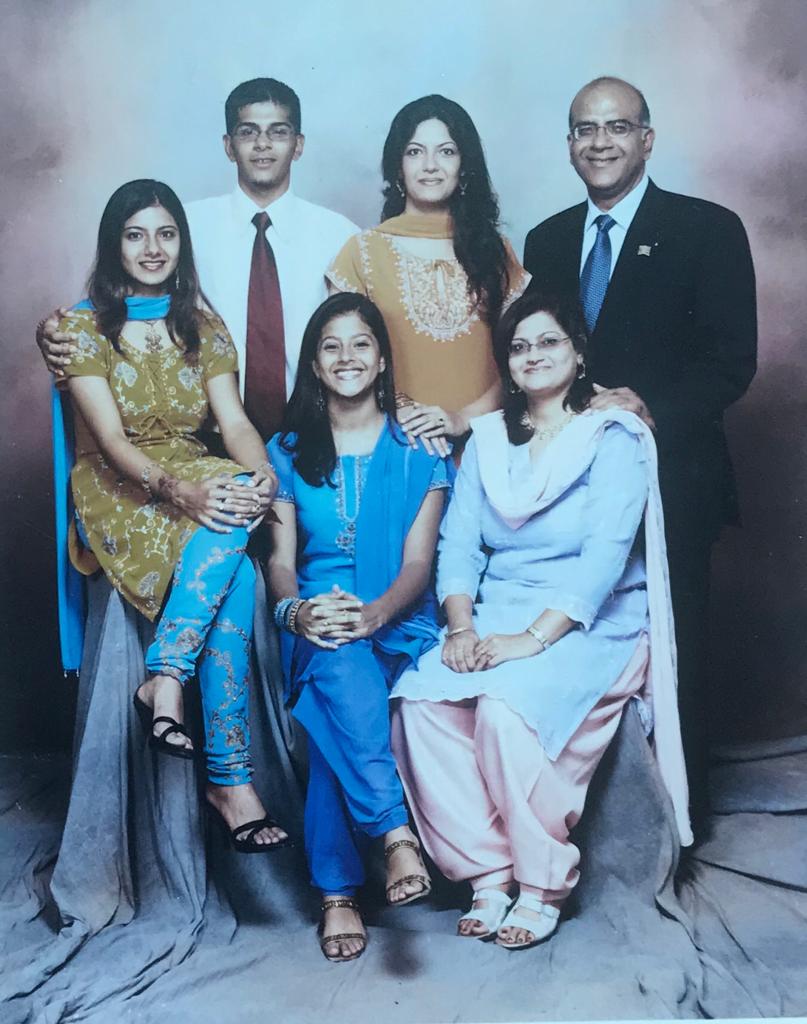
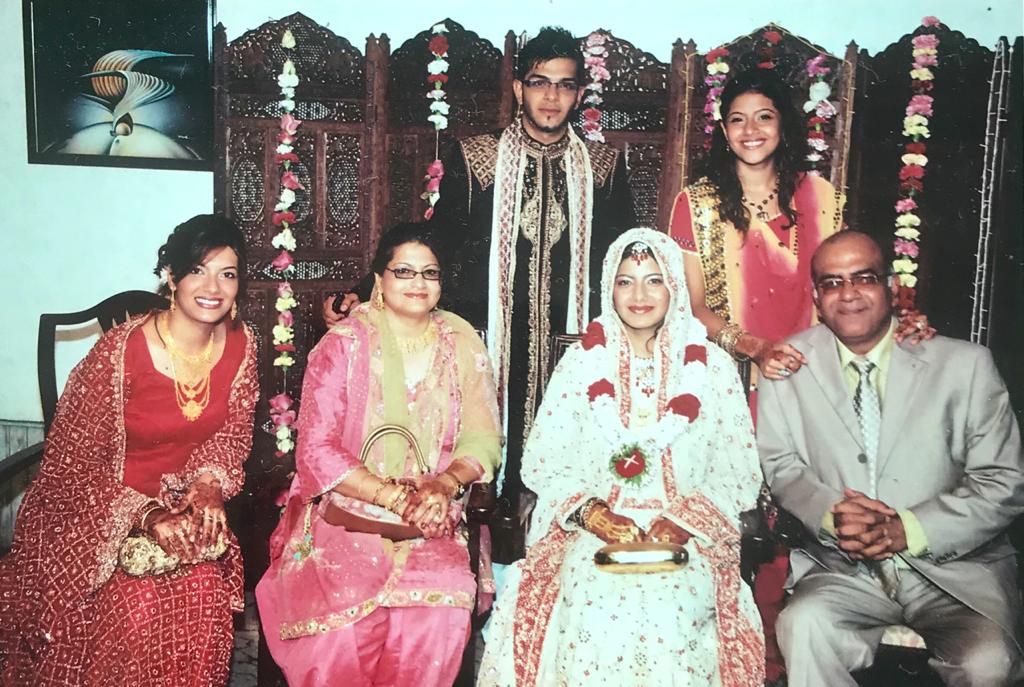
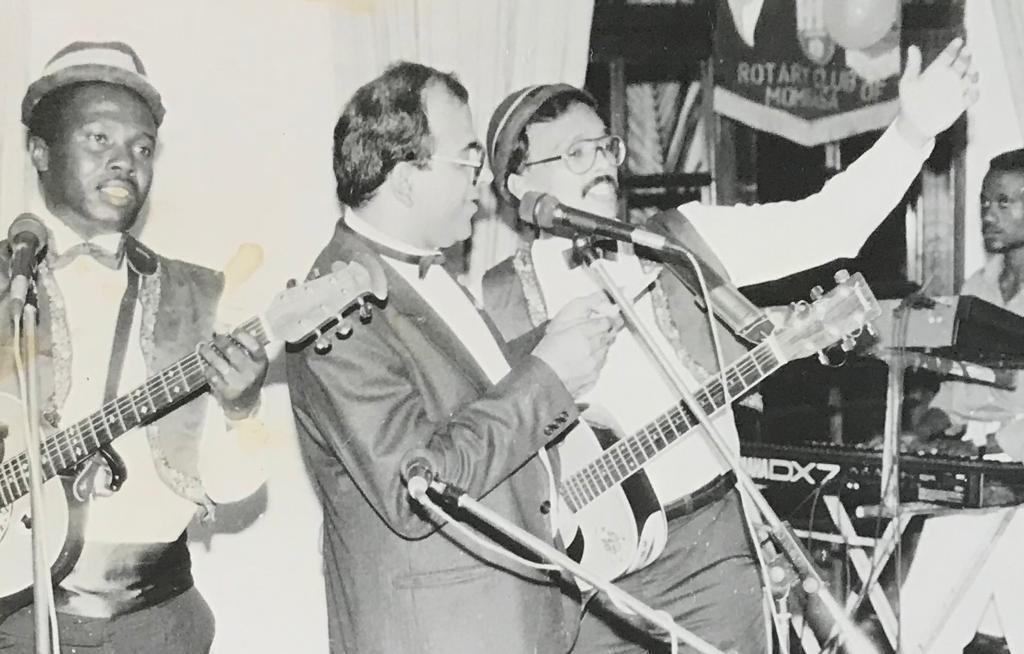
What next after Presidency?
I will be the Secretary for the year 2021-2022, so as to be hanging around by design, and then give space.
On a lighter note, should we expect a biography soon with all the institutional memory you’ve accrued over the years?
Ha Ha! Ask me the same question in another few years!
What is your parting shot and advice to upcoming Rotarians?
All Rotarians are equal. We all pay the same subscription fee. Everyone can achieve anything and everything in Rotary because all are already successful in their vocations to start with, which is what makes one eligible to become a Rotarian in the first place. So, go get the job done! The Manual for Procedure is enough to teach you the ropes and negotiate all the necessary alleys.
Therefore, my parting shot most importantly is, ENJOY ROTARY!
Article By: Karen Rono | ronokaren5@gmail.com




